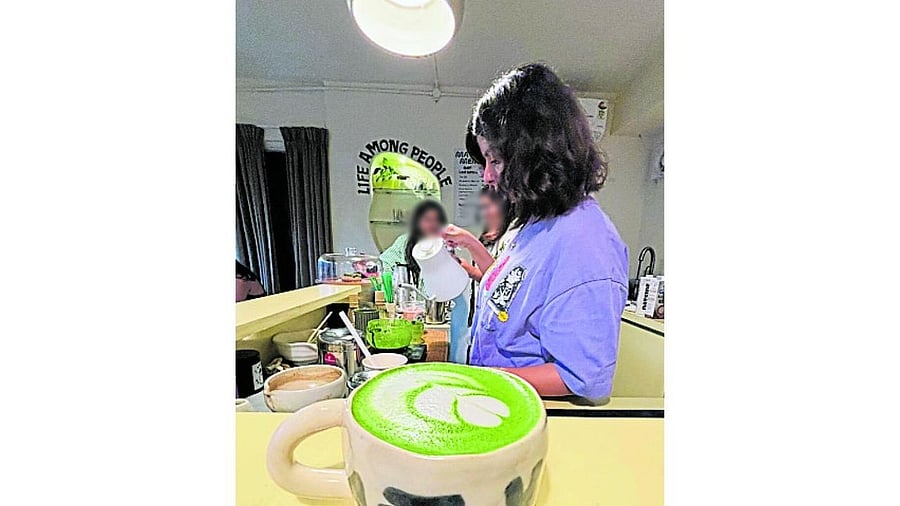
The OG matcha latte is one of the frequently ordered drinks at Yashika V’s matcha bar in Victoria Layout.
Credit: DH Photo/Pushkar V
Though coffee remains a staple, and will probably never be replaced, the city is seeing a growing interest in matcha, shade grown Japanese green tea which is ground to a powder.
Sought after for its umami flavour and health benefits, matcha has become part of mainstream café culture globally, thanks to experimental recipes and offbeat pairings.
In the past year, Bengaluru has seen a steady increase in matcha-only popups, specialty coffee stores with matcha on their menu and a handful of online matcha brands.
Sridhar V, a resident of Rajarajeshwari Nagar, began experimenting with matcha two years ago. Getting it locally was difficult, so he would ask his brother, who was living in the US, to bring it for him. At the time, only an international coffee chain in the city served matcha — but it was “quite unappetising”, he recalls.
Therapeutic ritual
Now, he finds matcha is easily available, especially through small businesses that ship it from Japan. The tools needed to make the drink — from the whisk (chasen) to the mixing cup (chawan) and spoon (chashaku) — are also easy to find online.
“I find the whole ritual of making matcha therapeutic. It starts with sieving the tea, then whisking and mixing in milk or other liquids. I generally make an iced matcha latte, but I have also tried blending it with tonic water for something light and refreshing. I recently made a strawberry matcha drink with macerated strawberries and cold milk,” he shares.
Ceremonial grade — or first harvest — matcha is the highest quality, and connoisseurs mostly opt for it. However, most cafés in Bengaluru use gourmet matcha in their drinks, Sridhar notes.
Popups and stores
Business strategist Anokhi Bhardwaj started a social media page dedicated to matcha out of personal interest. In 2024, she noticed a handful of new matcha brands springing up in India. “At least 10 brands were launched,” she recalls, adding that matcha pop-ups have also grown in recent months.
Tokyo Sweets, an Instagram page which makes matcha and mochi (Japanese dish), and Mezame, a Bengaluru-based brand which sources matcha from Japan, have been holding regular popups.
Sakura Matcha Bar, Victoria Layout, also began its journey in 2024 by holding pop-ups across the city — at art and craft stores, beauty salons, and record shops. It is run by cousins Yashika V and Neha Reddy. Yashika, who returned to Bengaluru from Berlin last year, got hooked onto matcha after trying it in Singapore in 2019. The pop-ups, which were held almost every weekend, helped the duo better understand market preferences.
At their shop, one can choose from options like a blueberry matcha latte or dirty matcha (with a shot of espresso). For first-timers, Yashika recommends The OG, a hot matcha latte. The bar uses oat milk, which she feels is the best pairing. “Regular milk can be overpowering,” she explains.
Many of the duo’s customers are regulars. “A number of people came in curious about matcha and have since gotten hooked. Some drop by every day,” she shares. The average price of a drink at Sakura costs Rs 375. They use ceremonial grade matcha, which is not easy on the pocket.
Though matcha can be an expensive interest, it is more cost effective to make it at home, points out Anokhi. The matcha can set you back by Rs 1,200 (30g) on average, for a good quality option. “This quantity will last you a month,” she shares. The kit (which typically includes a whisk, a mixing cup, and spoon) costs anywhere between Rs 1,500 and Rs 2,000. “There are options for Rs 5,000 too, but I would not recommend it,” says Anokhi, adding, “In fact, I don’t think one needs the cup either. All you need is a whisk and good matcha. It can be whisked in any cup. Whisks can be replaced once a year.”
How to choose your matcha
(By Anokhi Bhardwaj)
*Check the quality of the matcha. Ceremonial grade is just a marketing term — make sure you’re buying first harvest matcha, which is the highest quality.
*Good matcha is expensive, priced anywhere between Rs 800 and
Rs 1,200. If it costs less, it’s best not to risk it.
*If it tastes grassy and bitter, it’s not good quality. Good matcha is naturally sweet, like peas.
*A rich green colour indicates good quality. If it’s yellowish or pale, it’s likely a later harvest or oxidised — meaning it’s stale.